What are the must-know Japanese Autumn words?
In this guide, you’ll pick up 25+ words that are used around autumn time. Culturally relevant words. Unique words. Japanese nature words.
So, take a scroll down, start absorbing these words, and start speaking some autumn Japanese. Cool? Cool. Well, it is cool during autumn so, … cool.
Okay, cool, let’s go.
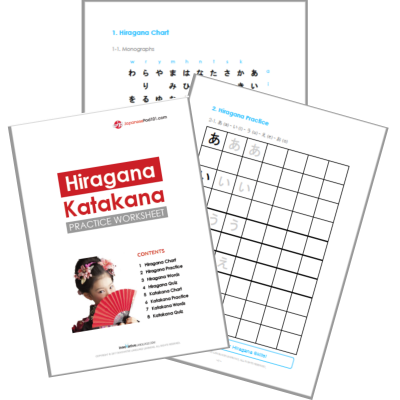 | Want to learn how to write in Japanese? Download your FREE Japanese Alphabet eBook here (click here). |
1. 秋 Autumn/Fall
- Pronunciation
- Aki
Let’s start the list of Japanese autumn words with Aki. It’s how you say fall or autumn in Japanese. The kanji can be broken into two parts – the radical generally associated with grain (禾) and the kanji for fire (火). Japan uses a lot of seasonal imagery in its language and literature. This can even be seen within their kanji, which makes us visualize the fiery red leaves of autumn.
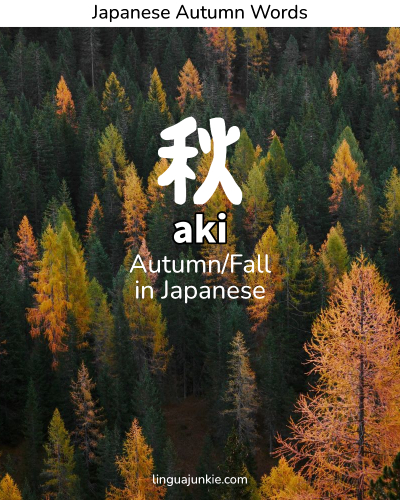
2. 紅葉 Leaves changing colors / Autumn colors / red leaves
- Pronunciation
- Kouyou
The start of autumn in Japan can be marked by the changing colors of the leaves.
The literal translation for 紅葉 is “red leaf”. Japan is home to many beautiful mountain ranges that are especially beautiful in the autumn as they turn into a brilliant crimson blanket of leaves.
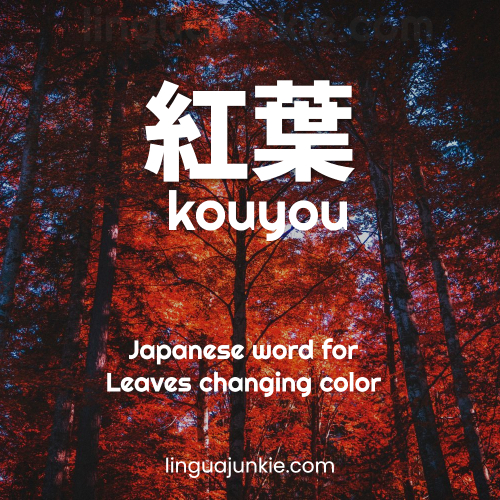
3. 紅葉 Japanese crimson maple leaves
- Pronunciation:
- Momiji
Pick apart the characters and this just means “crimson” and “leaves.”
You may have noticed that the kanji for this is same as “kouyou,” the word before it. Well, 紅葉 can be read as both “kouyou” or as “momiji.”
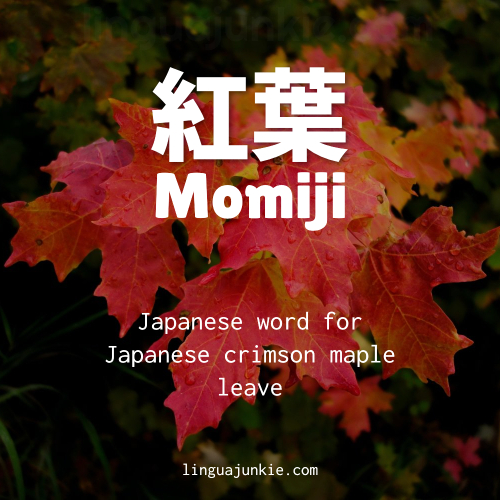
4. 紅葉狩り Red leaves/maple leaf viewing
- Pronunciation
- Momijigari
Momijigari is the custom of going to view the regions full of beautiful autumn red leaves and is a fun activity that can be enjoyed with friends! The changing of autumn leaves often begins in the north of Japan (Hokkaido) in September and gradually moves its way down to the southern regions.
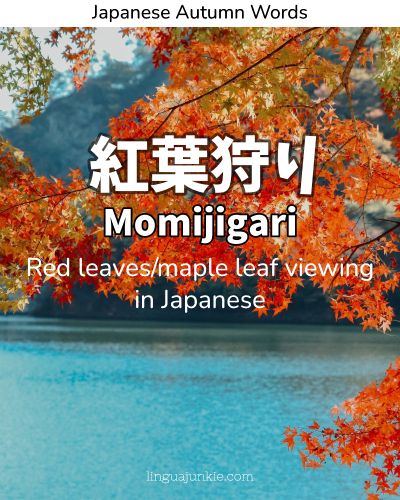
5. 落葉 Fallen Leaves
- Pronunciation:
- Rakuyou
This is another fall-themed word and a common scene that you can see anywhere in the world during the Autumn season — falling leaves. In English, it takes 2 words to express it. In Japanese, it’s just one. And because it’s one, it carries a stronger image of autumn, fallen leaves and the atmosphere.
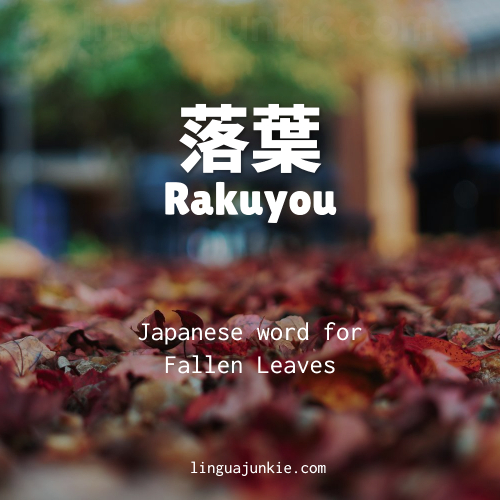
6. 柿 Persimmon
- Pronunciation
- Kaki
Autumn in Japan is not only full of beautiful nature, but is also filled with delicious seasonal foods! Kaki, or persimmons, are a sweet fall fruit eaten fresh or dried. It resembles the texture of a seedless tomato and contains flavors reminiscent of apple and mango without acidity. This cute round orange fruit is a staple Japanese autumn food.
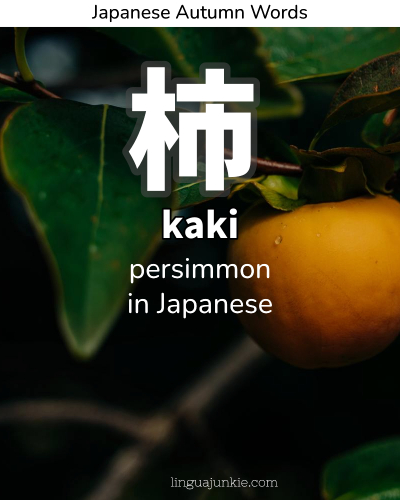
7. さつま芋 Japanese sweet potaw
- Pronunciation
- Satsumaimo
Continuing on the trend of food, Satsumaimo, or Japanese sweet potato, is another autumn staple. They are known for their purple skin and sweet, fluffy, yellow inside. Satsumaimo can be found everywhere in the autumn season, often flavored with a sweet and salty mix of soy sauce and sugar. They are found in many sweets during this season and have even been featured as a seasonal Starbucks flavor!
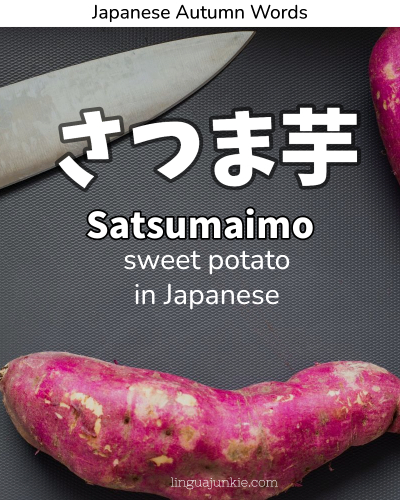
8. 焼き芋 Baked Japanese sweet potato
- Pronunciation
- Yaki-imo
Yaki-imo is what happens when you bake the previous word on this list – satsumaimo, and it literally means “baked potato.” Yakiimo is essentially baked over long periods of time, resulting in a fluffy, rich, melt-in-your-mouth sweetness.
You can buy these on the streets between Autumn and spring from slow driving sweet potato trucks that play a “yakiii-mooo” over their loudspeakers. These baked sweet potatoes are one of the most common Japanese street foods after all.
9. 月見 Autumn moon festival
- Pronunciation
- Tsukimi
Tsukimi is a Japanese festival honoring the autumn moon. Some traditional festival activities include displaying decorations such as susuki leaves (Pampas grass) and eating tsukimi dango (moon-viewing dumplings). Other seasonal foods such as satsumaimo and chestnuts may be given as an offering to the moon.
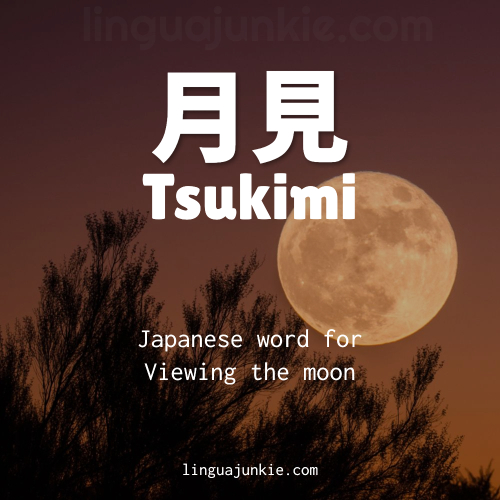
10. 七五三 The Seven-Five-Three Holiday
- Pronunciation
- Shichi-Go-San
Shichi-Go-San has a literal translation of seven-five-three but is actually a rite of passage ceremony and festival that is held on November 15th to celebrate the health, well-being, and survival of children. Young girls aged 7 and 3, and young boys aged 5 will dress in kimonos or other formal wear. In modern times, children are often photographed to commemorate this rite of passage.
11. 涼しい Cool (temperature)
- Pronunciation
- Suzushii
Suzushii is a Japanese weather word that describes cool temperature. It means cool or refreshing and is often used to positively describe the cool breeze and weather that marks the transition between summer and autumn.

- Relevant article: how to say cool in Japanese
12. こたつ Heated table
- Pronunciation
- Kotatsu
A kotatsu is a heated table that is used daily in Japan as the chilly weather begins to creep in.
Historically, kotatsu has been dug into the ground, with a charcoal heater that is placed on the floor. Blankets flow along the side of the table to trap the heat and maximize coziness. Modern-day kotatsu have electric heaters attached to the underside of the tables and are not dug into the ground.
However, the basic idea remains the same. While kotatsu may be a word more associated with cold winter months, it definitely begins to make an appearance in the suzushii autumn season.
By the way, this is also a good Japanese winter word to know.
13. 秋富士
- Pronunciation
- akifuji
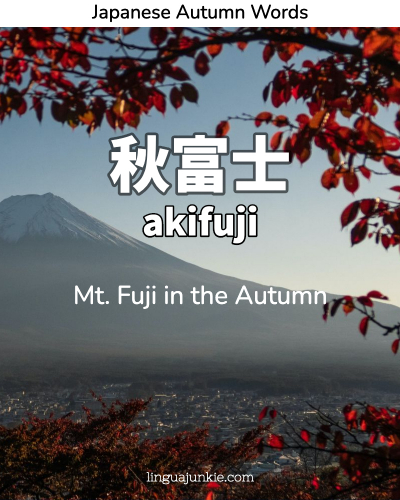
This word is just a combination of “aki” (autumn) and “Fuji” a.k.a. Mt. Fuji and refers to the combination of Mt. Fuji and autumn scenery. So, if you were to take a picture of Mt. Fuji with red momiji leaves in the shot, one could call that “Akifuji.”
14. 秋風 Autumn wind
- Pronunciation
- Aki kaze
秋風 is a combination of two kanji/words. 秋, as you know, is aki or Autumn. Then, 風, or kaze, means wind. So, when the chilly wind starts blowing in September or October, that’s some akikaze for you.
Now, speaking of Autumn wind…
There’s an interesting saying using this word.
15. 秋風が吹く。Falling out of love.
- Pronunciation
- Aki kaze ga fuku
Literally, it means “the autumn wind blows.” However, another meaning for it is “falling out of love.” As in, when one’s feelings begin to cool for their other half, like the blowing of an Autumn wind.
16. _____ の秋 – ____ of autumn
- Pronunciation
- ____ no-aki
Now this combination of Japanese autumn words needs some explanation.
You likely won’t learn in a textbook.
So, there are many sayings in Japan where autumn is associated with specific activities in Japan such as “dokusho no aki” (reading of autumn), “supootsu no aki” (sports of autumn), and more. Why?
One of the reasons for these sayings is that there is a lack of busy activities and holidays during the autumn while also having more favorable temperatures than the hot summer. Japanese summers are too hot. Japanese spring has the end of the fiscal year as well as the end and start of the school year. And with winter, businesses are in a rush to get things done by end of the year and take off for the holidays. So, this makes autumn the time to enjoy relax and… read or go to a museum.
Another way to interpret these statements is as “it’s the season for <insert activity.>,” which is usually autumn.
17. 読書の秋 Reading of autumn
- Pronunciation
- Reading of autumn
As the days grow shorter and the nights grow longer, this saying suggests that autumn is the perfect time to catch up on one’s readings. Winter and spring can have holidays and events like Christmas, New Year, school graduations, and entrance ceremonies. However autumn is a quiet time of the year in Japan and there is more free time to enjoy at home with a cozy book.
18. スポーツの秋 Sports of autumn
- Pronunciation
- Supoutsu-no-aki
This saying is used because, in the autumn, the weather is not too hot and not too cold. This provides the perfect temperature for getting outside and playing sports. Historically, elementary and middle school children also enjoy Sports Day in autumn. Sports Day consists of a school’s students dividing into a red and white team, competing in physical exercise-based tasks for the most points.
19. 食欲の秋 Appetite of autumn
- Pronunciation
- Shokuyoku-no-aki
Just as animals begin to prepare for winter hibernation in autumn, this saying suggests that we all have a growth in appetite as this season approaches. As the air cools and warm seasonal food surrounds us, we fill our tummies with sweet potatoes, chestnuts, and other warm, nourishing foods.
20. 芸術の秋 Art of autumn
- Pronunciation
- Geijutsu-no-aki
There is no doubt that the autumn season provides us with some of the most beautiful views of nature. This saying reflects one’s desire to capture these brilliant seasonal images in the form of art – paintings, writing, poetry, etc.
21. 山粧うMountains in Autumn Foliage
- Pronunciation
- Yama yosoou
If you’ve been to Japan during fall, you would see just how the mountains change color. And that’s where this Japanese autumn word comes in. First, yama means mountain. Then, that second word, 粧う(yosoou) means “to dress” or “decorate.”
So, as if the mountains have been decorated in green, red and yellow leaves.
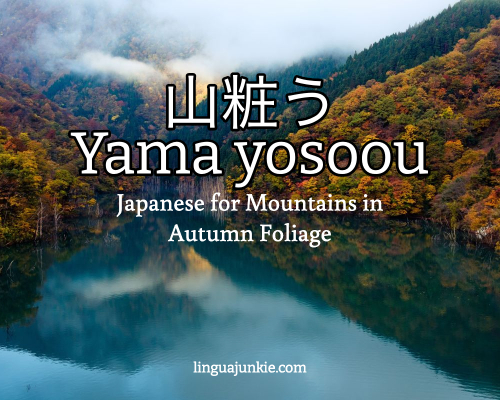
22. 秋晴れ Clear Autumn Weather
- Pronunciation
- Akibare
The “bare” (bar-eh) in “Akibare” is the word, hare, one of the most common Japanese weather words meaning “clear weather” or “sunny.”
So, Akibare refers to the clear, almost cloudless Autumn sky and weather. The kind you’d see right after a typhoon.
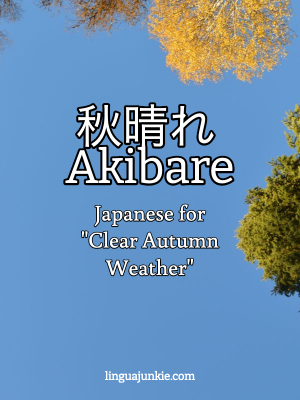
23. 秋高し High Autumn Skies
- Pronunciation
- Aki Takashi
Japan is a fairly rainy country. Especially in the summer. But, Autumn is known for mostly clear skies. And when there are less clouds, the sky just seems… well… sky high. Higher than on a cloudy day. And that’s where this word comes in.
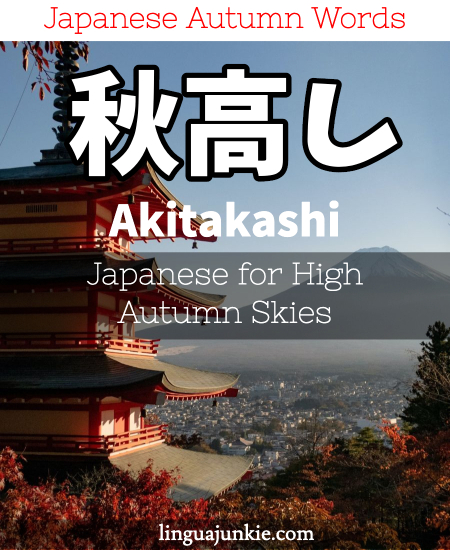
24. 秋の川 Clear Autumn Rivers
- Pronunciation
- Aki no kawa
This word describes the clear, cool rivers during the Autumn season. Though literally, it means “autumn river.”
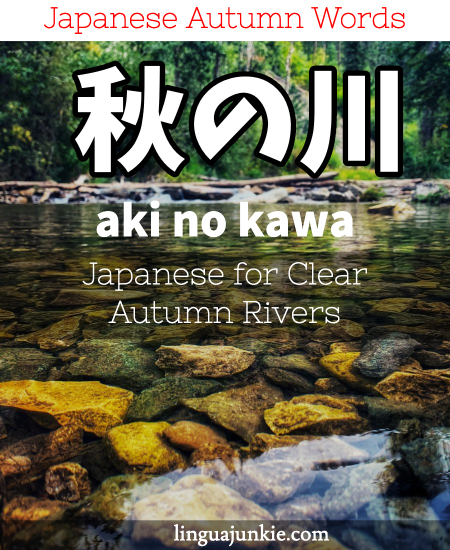
25. 照葉 Beautiful Shiny Autumn Leaves
- Pronunciation:
- Teriha
When the sun shines on the fall foliage, it almost seems as if the yellow and red maple leaves are shining. Hence where this word comes in. The first Kanji, 照, means shine or illuminate. The second one, 葉, means leaf.
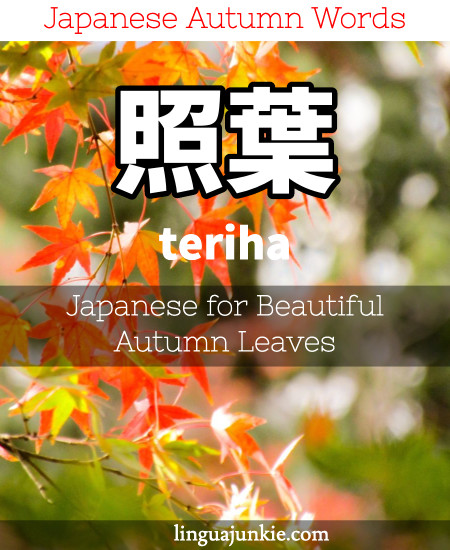
26. 秋の気配 Signs of Autumn
- Pronunciation:
- Aki no Kehai
Kehai is a new word here. It means “hint” or “indication.”
So, when you feel that chill in the air despite Autumn having not started yet, you get a feeling that Autumn is coming. That’ a “aki no kehai.” A sign of Autumn.
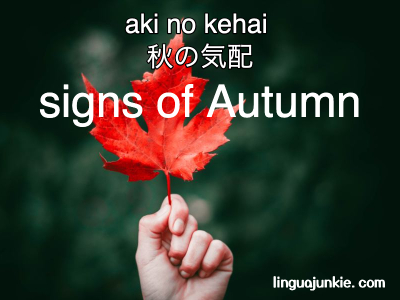
Conclusion— Back to You.
Now, you know some common Japanese autumn words.
If you want to know other seasonal words, check out the links below:
What’s your favorite one here?
Leave me a comment. I read ’em all.
– Lingua Junkie
P.S. Interested in learning Japanese? This Japanese course for Absolute Beginners from JapanesePod101 is FREE for a limited time only. They plan to close it down in the future, but while it’s still open, give it a try. Click the image below.


